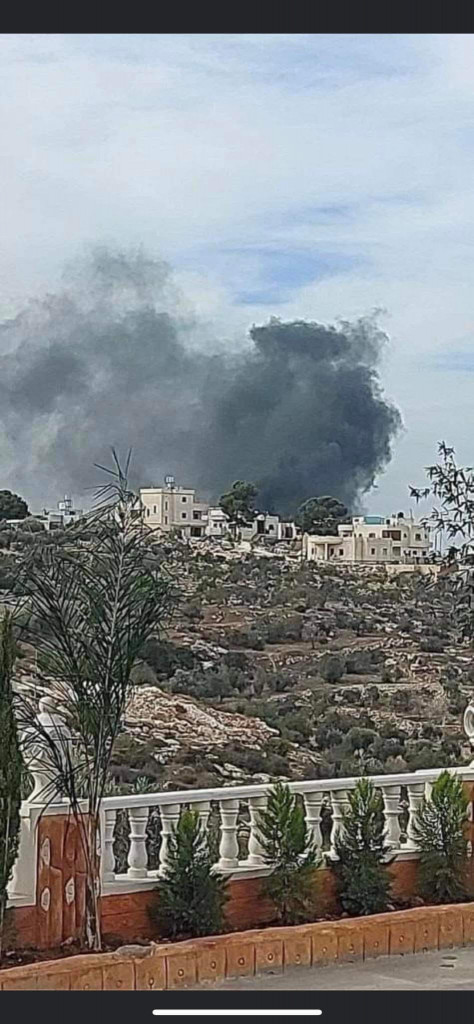Reportage
Palestinians are dying from cancer from the toxic waste they burn to survive
In Palestinian communities south of Hebron, toxic fires of technological materials have become the only source of income. But it pays in human lives: cancer rates are four times higher among children.

Bassma Sweti, 51 years old and a mother of six, is not complaining. She works in Beit Awwa, south of Hebron, and in the surrounding villages. She has a business that is quite profitable in these parts, where weddings are frequent, especially in the spring. She films women at wedding parties. In more traditional Palestinian communities, men and women sit in separate rooms at weddings, and female photographers who work only with the female guests are in high demand.
“I’ve reached economic security,” Bassma tells us after we ask her about the situation in Beit Awwa and the nearby villages of Idhna and Beit Samet, which have made Palestinian and Israeli headlines due to the significant increase in cancers among children and adults. “In our extended family, we have lost relatives who fell ill with cancer,” Bassma confirms. “In November, Mohammed, Fairouz and Khaled died, aged 40, 38 and 22, and shortly after that, a little girl, Julia, 7 years old. They were not the only recent cancer victims. Every family here has gone through grief.”
According to university research, cancer among the youngest children in Beit Awwa and the rest of the district south of Hebron is four times more common than in the rest of the Palestinian West Bank. The authorities in the area know the cause: the burning of electronic and electrical waste. But few manage to find a good job like Bassma Sweiti, and so dozens of residents set fire to old computers, cell phones, tablets, cables, washing machines and refrigerators in order to extract copper and other metals to sell on the black market.
These tons of waste are arriving largely from Israel and other areas of the West Bank. For the companies in charge of safely disposing of this waste in Israel, it is more convenient to move them to the West Bank on the basis of agreements made with Palestinian “entrepreneurs” in the sector. The latter, in exchange for not-very-generous fees, guarantee the “elimination” of the e-waste. Over the past two decades, this has become a booming business in this Palestinian region, where there is no work and where Israeli military occupation hinders economic development.
“I’ve never found a good job here or in Hebron, and I don’t have a permit to go look for one in Israel,” we are told by another resident, Hani, 27 years old. “Burning garbage is the only way for me and many others to bring home some money. It’s bad for your health, we know that, but we have no alternative.”
At one time, Beit Awwa was known to all Palestinians for selling used goods: from washing machines to televisions, from computers to old phones. On weekends, dozens of families would arrive from all over the West Bank, even from Israel, looking for a still-functioning household appliance to buy at bargain prices. Then, when Israeli governments completed the Separation Wall in the West Bank, the flow of people stopped. Today, the columns of toxic black smoke rising from the fires lit near the village are proof that, despite the health risks and the many deaths from cancer, burning electronic waste and recovering valuable metals to sell on the black market remains an income-generating activity.
Drivers of trucks with Israeli license plates, enjoying wide freedom of movement, are transporting the waste to Beit Awwa and other villages, where, after burning it to remove the plastic, men, women and teenagers extract the metals from the cables and equipment.
According to local sources, the most industrious earn between 10,000 and over 50,000 shekels ($3,000 to $15,000). These are significant sums in the West Bank, where the 16% of Palestinians employed by the National Authority earn less than the minimum wage of 1,500 shekels ($400) per month and the real unemployment rate among young people is close to 50%.
The municipality of Beit Awwa has launched more than one campaign to put an end to the toxic fires and alert the population to the health dangers they pose. At the same time, the authorities often choose not to intervene and not to punish offenders in order to avoid dealing a blow to the many families who have no other income.
The price of all this is paid in human lives. One of the most dangerous contaminants released during the combustion of e-waste is lead, which can cause irreversible damage, especially in young children who are more likely to absorb high doses of toxic substances than adults, partly because they play outdoors. As of a few years ago, there were more than 200 illegal burning sites that dispersed hazardous metals over long distances.
One study has recorded that among children and teens under the age of 15 living around Dura in the Hebron governorate, the rates of lymphoma are two to four times higher than those found in the rest of the West Bank or Israel. Data collected by a group of university students shows that in Deir Samet, more than half of a sample of 22 children had very high levels of lead in their blood.
Some fear the alarm has been sounded too late. Even if the fires all stopped today, the deadly effects of toxic pollutants in Beit Awwa and other villages will be felt for years to come.
Originally published at https://ilmanifesto.it/rifiuti-della-modernita/ on 2022-01-13
